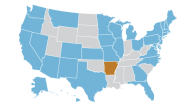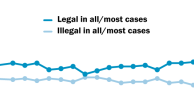
Liberals Less Engaged on Abortion Issue
Only a small minority of Americans (15%) say abortion is a critical issue facing the country today, down from 28% who said this in 2006. One-third says it is one important issue among many, while nearly half of the public (48%) says the issue of abortion is unimportant.
Analysis of the survey reveals that across all groups, relatively small numbers say that abortion is a critical issue. Yet there are also differences in the importance that different groups place on abortion.
Those who say abortion should be illegal are much more likely to see abortion as a critical issue (27%), or at least as one important issue among many (40%), with 30% expressing the view that abortion is not an important issue. By contrast, among those who say abortion should be legal, about two-thirds (65%) do not see abortion as an important issue, while only 6% see it as a critical issue.
Consistent with this, members of groups that are more opposed to abortion generally rate the abortion issue as more important than groups that support legal abortion. A quarter of conservative Republicans (26%) say it is a critical issue, compared to just 8% of liberal Democrats, 64% of whom say abortion is not an important issue.
Among religious groups, white evangelicals (and especially those who attend services more often) see the abortion issue critically important (29% overall, and 35% among high attenders) or as one important issue among many (42% each). White mainline Protestants and the unaffiliated, by contrast, are the least likely to say the issue is a critical one (7% each), and most likely to say the issue is not important (60% and 70%). There is also a wide discrepancy between Catholics who attend Mass weekly and those who do not; among the former, 21% say abortion is critical, compared with 4% among those who attend less often. Black Protestants are less likely than white evangelicals to say abortion is critical (17% vs. 29%), but more likely than white mainliners (7%). A plurality of black Protestants (42%) say abortion is not an important issue.

Declines in the perceived importance of the issue of abortion have been broad-based, but there are major political differences. In 2006, one third of conservative Republicans and liberal Democrats alike rated abortion as a critical issue. Since then, the percentage of conservative Republicans who rate abortion as a critical issue has dropped nine points, to 26%. But the drop has been much sharper among liberal Democrats: only 8% now say the issue is critical, a decline of 26 percentage points.
Among white Catholics who attend Mass weekly (most of whom oppose abortion), one-in-five continue to rate abortion as a critical issue, which is essentially unchanged since 2006. By contrast, among white Catholics who attend Mass less regularly (most of whom support legal abortion), the figure has dropped from 20% to 4%, a decline of 16 percentage points. Similarly, among the unaffiliated, there has been a 19-point drop, from 28% to 7%.
Worship service attendance overall is also linked with the change in the perceived importance of the abortion issue. Those who attend least regularly are now 18 points less likely to rate abortion as a critical issue, compared with a six-point drop among those who attend weekly and a 13-point drop among those who attend monthly or yearly.
Most Are Confident About Own Position on Abortion

Two-thirds of Americans say they never wonder whether their position on abortion is right or not. One quarter say they do sometimes wonder, down slightly from 30% three years ago.
Opponents of legal abortion are most certain of their position, with 73% saying they never wonder whether their own view is correct. This is especially true of those who are most opposed to abortion; among those saying abortion should be illegal in all cases, nearly eight-in-ten are fully convinced of the correctness of their view. But most supporters of legal abortion are also firmly convinced that their position is right, with nearly two-thirds of abortion rights supporters overall (63%) and three-quarters of those who think abortion should be legal in all cases (73%) saying they never wonder about their own position.
A similar pattern is seen among other groups as well. Certainty about one’s position is high among all groups but is somewhat higher among the most pro-life groups, including conservative Republicans and evangelical Protestants, than among others.
Traditionally conservative groups also stand out for having become more certain in their views. Conservative Republicans are now 11 percentage points less likely to say they ever wonder about their stance on abortion than they were in 2006, while opinion among other political groups has not changed significantly.

A large decline in the number of people expressing doubts about their view on abortion is also evident among white evangelical Protestants, down from 32% to 20% (12 points). By contrast, the numbers of Catholics and white mainline Protestants expressing doubts about their abortion views are virtually unchanged. Similarly, those who attend services at least weekly are 11 points less likely than in 2006 to say they ever wonder about their position on abortion, while the certainty of those who attend less often has not moved significantly.
Half Respect Opposite View on Abortion

Americans who express a view on abortion are divided over whether the opposing view on abortion is a respectable opinion for someone to hold, with 47% saying the opposing view is respectable and 44% saying it is not. Half of those on the pro-choice side say they respect the view of those who think abortion should be illegal, slightly higher than the number who say they do not (42%). Among those on the pro-life side, 44% say that pro-choice views are respectable and 47% say they are not. Those with the most intense abortion opinions are least likely to express respect for the opposing view; among both those who say abortion should be legal in all cases and those who say it should be illegal in all cases, majorities say the opposing point of view on abortion is not respectable.
Young people tend to be more tolerant of opposing viewpoints on abortion than their older counterparts. More than half of those under age 30 (57%) say the opposite view from their own is respectable. Among those age 65 and older, the reverse is true; seniors are much more likely to say it is not respectable to hold the view opposite from their own (51% not respectable vs. 34% respectable).

Most conservative Republicans say that opinions on abortion that differ from their own are not respectable. By contrast, most independents say that the opposing view on abortion is respectable. In other political and ideological groups and in most religious groups, people are divided over whether it is respectable for someone to hold an abortion opinion different than their own. The notable exception to this rule is white evangelical Protestants, among whom 53% say the opposing view is not respectable, while 37% say it is.
Those whose position on abortion goes against the grain of their party or religion are more respectful of views different from their own. For example, pro-choice Republicans are much more likely to say the opposing viewpoint is respectable (58%) than are pro-life Republicans (34%). And among pro-life Democrats, more say the opposing view is respectable than among pro-choice Democrats (55% vs. 44%).

A similar pattern exists with regard to religion: 52% of pro-choice evangelical Protestants express respect for the opposing view, compared with 32% of pro-life evangelicals. And among those who attend services weekly or more, those in the pro-choice camp are more likely to respect their opponents than those in the pro-life camp (49% vs. 37%).




